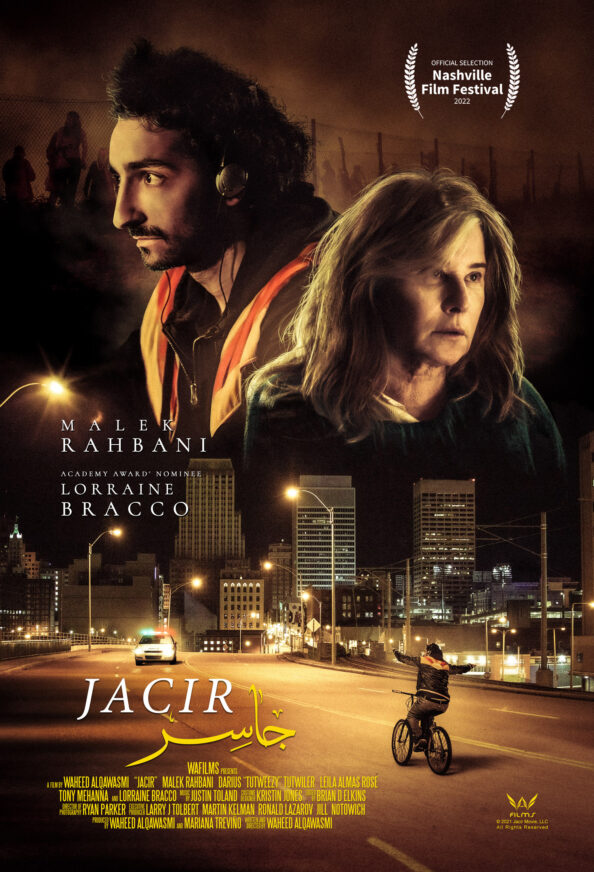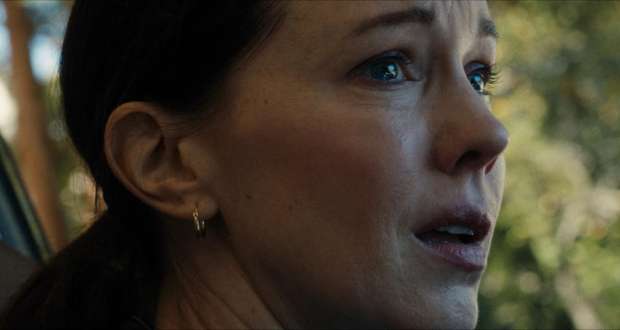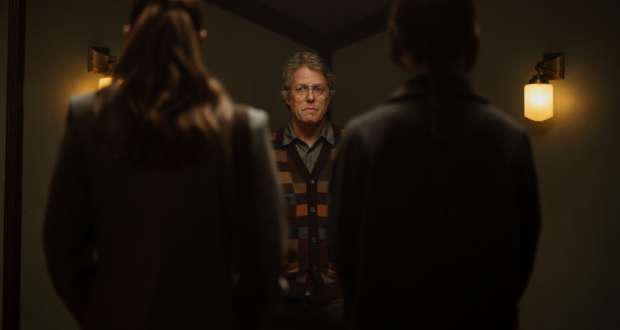“Jacir” screened on Friday, September 30th, at the 53rd Annual Nashville Film Festival. It is the story of a refugee, Jacir, as he flees Aleppo (Syria) and tries to assimilate into the ghetto (Memphis, Tennessee). Written and directed by Waheed Qawasmi, the 1 hour and 44-minute film is filled with great performances, good rap music, and a variety of profound insights into what life as an immigrant in the United States is like.”
Synopsis: “JACIR follows the life of a young Syrian refugee (Malek Rahbani) on the streets of Memphis, Tennessee, as he faces the stark reality of chasing the American dream. He finds himself alone, living in poverty, without knowledge of the culture, and struggling with his poor English… very far from the ideal new life he imagined.” (”Land of the free. Bullshit!”)
Jacir is a Good Samaritan who tries to help others. This propensity for being there for others gets him into trouble with the immigration authorities and his sponsor, Adam (Tony Mehanna). The authorities, represented by Agent Simmons (Mark Jeffrey Miller), just want refugees to become ghosts. Don’t make waves is the operating mantra.
Jacir, however, is the kind of person who tries to help others out of empathy and instinct. He saves his neighbor’s life on one occasion and intervenes when she is being robbed by burglars. This causes his name to appear on police reports, which brings ICE authorities down on him causing increased scrutiny of his paperwork and an actual chase through the streets of Memphis.” He faces deportation until a climactic moment when others reach out to help him.
A strange new environment is the least of Jacir’s problems. He befriends a cat, Morty, who belongs to his next-door neighbor, Meryl Jackson (Lorraine Bracco) “Good old Meryl” is a conservative Caucasian lady who is an opioid-addicted shut-in and former blues singer. Her character represents a large swath of America who reflexively rejects people from another country as interlopers, reacting with suspicion and hostility, no matter how friendly the stranger appears. Unwelcoming is an understatement.
Tremendous Thespian Trio
The three leads portraying Meryl, Jacir, and Jerome are terrific. They are ably supported by the actors playing the restaurant boss, Adam, and his daughter, Nadia.
Lorraine Bracco, who plays Jacir’s next-door neighbor, is an Oscar, Emmy, and Golden Globe nominee known for her turns in Martin Scorsese’s Goodfellas and David Chase’s The Sopranos, among many other films and TV projects. Bracco gets the line, “I’m not good at a lot of things, but I am good at listening.” I’m certain I’m not the only “Sopranos” fan in the audience who immediately thought of Bracco’s stint on that show as Tony Soprano’s psycho-therapist, Dr. Jennifer Melfi, a role she played from 1999 to 2007. That whiskey quality in her voice made her character’s back story as a blues singer very believable and gave her singing of the song “Night by Night” authenticity. Meryl, as a widowed woman estranged from her only son, finally “does the right thing” and accepts Jacir’s overtures of friendship and goodwill, instead of expressing her initial racist diatribes. Her performance is in line with her outstanding role in “Goodfellas” in 1990 for which she received an Oscar nomination as Best Supporting Actress at the 1991 Academy Awards.
Newcomer Malek Rahbani is the grandson of Mansour Rahbani, the Lebanese composer, musician, producer, and one-half of the Rahbani brothers. Malek grew up surrounded by artists, music, and poetry. His TV career includes playing Tiger on Chawareh Al-Zill and co-writing and acting in the Jungle Law series, which he worked on with his brothers, Mansour and Tarek. He is one of a formidable trio of lead actors in this thoughtful film, gradually growing close to “good old Meryl” and experiencing rejection from his employer and sponsor, Adam, who tells him, “I curse the day I sponsored you.”
The third member of the Terrific Trio of actors in this exploration of the refugee experience in the United States is a Black comedian and actor Darius “Tutweezy” Tutwiler, a social influencer with over 700,000 followers on Instagram. Jerome, a co-worker of Jacir’s at the Arabic restaurant shares the realization that they are both outcasts in this country, shunned and discriminated against. At one point, Jerome tells Jacir that he is “one step closer to being a Memphis n—-.” Jacir’s showing up in a Trump/Pence shirt that says, “Making America Great Again” is a nice sarcastic touch (Jerome makes him go change).
Justin Toland composed the music; Al Kapone executive produced the rap song. The music is an integral part of the film. Like America itself, reactions to Jacir are a polyglot mélange of racist views that one might hear from the MAGA crowd (especially prominent in a restaurant scene). Against that fabric, we see the hopeful attempts to fit in and be useful from the good-hearted Jacir, the general indifference of white residents like Meryl or the immigration officials, and the brave souls who recognize that Jacir is deserving of their compassion and empathy.
The script is insightful and thought-provoking. The character of Jerome makes it very clear that being Black in America is not much better than being an immigrant refugee; the destruction of the restaurant where Jerome and Jacir work, with graffiti saying “Sand N——” underscores the truth of what Jerome says. (“We go through the same shit, fool!”) Cinematography by Ryan Earl Parker depicts Memphis’ Beale Street almost as though it were a fever dream like those that afflict Jacir almost nightly as he remembers the war-torn Syria from which he fled.
I nodded my head in agreement when the screenplay articulated the thought, “It’s just so much easier to tear things down than to build them up.” These are concepts that people like Steve Bannon should take to heart. Convicted con-man Bannon promotes “the second turning” of complete destruction of all established norms and authorities in interviews. (See “American Dharma”).
As the script points out, it seems as though “Everyone (in America) is just out for themselves.” But Jacir is living up to his mother’s words that he should stay strong and composed no matter what happens. He is one of the “good guys” whose assimilation can make our country stronger and cancel out the evil deeds of immigrants like those who perpetrated the Boston Marathon Bombing. It is easier to understand why a foreigner might strike out against their adopted country when we experience life as seen through Jacir’s eyes. And, on the eve of Hurricane Ian, we must remember that good does still exist in this country, with strangers reaching out to help their fellow man, side-by-side with those who would collaborate to use pandemic funds set aside for hungry school children in Minnesota to buy luxuries. Even World Famous quarterbacks are implicated in such selfish behavior, but good people still exist, just as welcoming citizens balance out the racist isolationists.
At one point, Jacir cries out in agony, asking where he is supposed to be at home since he has been driven from his own homeland and is now being rejected by his adopted country. However, as Jacir says, “When you have a couple of bullets fly past your head—at that point neither religion, money or citizenship will help you out.”
This is a great film with a Terrific Trio of three lead actors who make it work. The love interest is Leila Almas Rose as the feisty Nadia and the critical look at the U.S. and how we treat immigrants is both scathing and long-overdue. Both “Tutweezy” and Malek Rahbanni do themselves and the film proud on what I hope will be the beginning of many future films for each. Jacir screened at the Nashville Film Festival in 2022.























